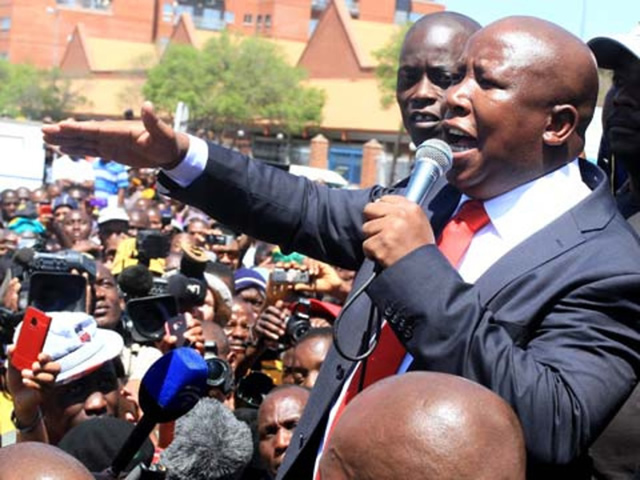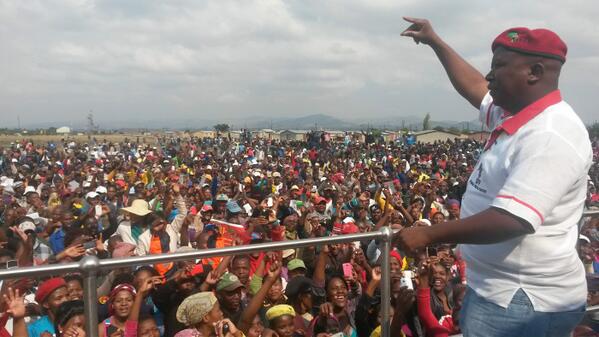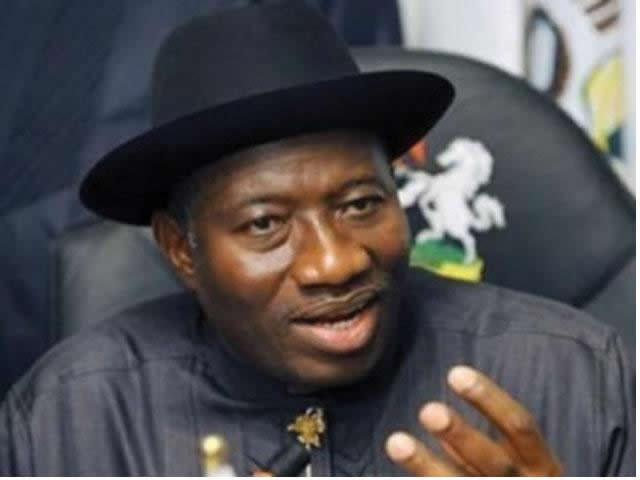Planting seeds of economic freedom

Tichaona Zindoga Senior Political Writer
It is clear, though, that it is the EFF that carries the torch of economic freedom in South Africa’s lifetime.
And Malema on May 7 did plant the seeds for such a dispensation
It is every tempting to enthuse on the statistics of the recent elections in South Africa and the permutations post-elections, where real drama will play out, as it always does. The bigger picture, though, presented by the performance of Julius Malema’s party, the Economic Freedom Fighters, is even more interesting.
It will not hurt much to indulge the statistics and the permutations.
Malema is just 33 years old, making him the youngest party leader in the country.
Malema’s party was officially launched last July, as a “protest movement” and it subsequently made steps to be a formal outfit, including registering with the country’s electoral body in September and entering the political field in March this year.
It registered for these elections on the deadline day, March 12.
Its showing in the elections, with over one million votes or six percent, which translate to 25 parliamentary seats under the country’s proportional representation system, makes it the third largest party in South Africa.
It has snuffed out older parties such as Inkatha Freedom Party and Cope.
This state of affairs presents interesting dynamics.
First, here is the maths that Anwar Abdul Gany did for News24:
“So let’s do the 2014 election numbers, ANC (62,15 percent) + EFF (6,35 percent) = 68,50 percent. This is an exceptional number, exceeding the 66,66 percent required to legally tamper with our Constitutional rights.”
Malema could be the kingmaker — he once was in the ruling ANC — and accordingly “The power rest not with the President of the ruling party who holds a 62,15 percent mandate to govern, but rather, with yesterday’s King Maker, Mr Julius Malema and his 6,35 percent mandate. A small mandate, yet it could be the most powerful mandate ever in South African politics.”
Malema has so far shown that he is aware of his role and importance (he even scoffed at the old suggestion of it being cold outside the ANC; “it’s very, very warm,” he said, “How can you be cold when you are surrounded by one million people? They are our shield.”)
He may deploy that to devastating effect.
South African media report that Malema has indicated that in Parliament, if the DA were to cast a vote of no confidence against President Jacob Zuma, the EFF would join them while it would also support the ANC if the old revolutionary party were to instigate the policy of expropriation of land without compensation.
But then these are the hard issues.
The youthful politicians may change the face of parliamentary business altogether — that is especially if Malema himself is in the House.
He has indicated that he may not take up a seat, opting to send what he considers the best servants, and to show that EFF is not about Julius Malema.
There is also trouble with the law, which may yet prevent Malema from getting into Parliament.
However, drama will be inevitable: Malema and co prefer going to Parliament in their red overalls and some hand-cut and hand-painted hard hats called makarapa, which got the name from migrant workers that wore them in the 1970s and early ‘80s.
It is those same helmets that people see on TV donned by football fanatics.
A report quoted Malema as saying: “They will no longer be sleeping in Parliament because everybody will be awake ready to receive what the Economic Freedom Fighters are ready to say. We are not going to comply with unjust regulations and laws in Parliament.
“An unjust law is not law at all. And that is starting with the dress code.
“Why should people be refused to enter Parliament in overalls and be restricted to suits and ties?
“And if the weather allows, we are going to wear makarapa (hard hats).”
The iconoclastic Malema says some people in Parliament are “hiding their stupidity behind ties”.
Economic Freedom
The election results mean that Malema is to be treated with some respect now.
He deserves it.
However, the result does more than lift the man — a man of weakness — but elevates the message of economic freedom and this resonates well, in addition to the over one million South Africans, with many Africans in light of the growing resource nationalism.
The EFF preaches “economic freedom in our lifetime”.
South Africa, which transitioned to democracy after years of anti-black apartheid, may have what is often touted as one of the best constitutions in the world and Africa’s second largest economy but the majority black people are poor.
Some of the unflattering statistics in this are that blacks fare worst in human development indices such as health, education, housing, wealth and so forth.
The wealth of the country, in terms of mines and land, is in the hands of a minority white clique which has so far co-opted a few black faces.
Incessant worker strikes in mines, one of which turned deadly when police shot and killed 34 miners at Marikana, Rustenburg, have been emblematic of the economic dissent of the black man in South Africa.
This is why Malema found Marikana a fertile ground on the campaign trail, making the first and last rallies there.
Malema calls for the nationalisation of mines and expropriation of land without compensation.
He also calls for the nationalisation of banks.
He has the conviction that this will work for the good of the people of South Africa, even when there is a real and present danger of a backlash from countries such as the US and UK that benefit from the multinationals that pauperise black people of South Africa.
When he launched EFF as a “protest movement” on July 11, 2013, this writer put it to him whether he was not afraid of becoming “another Zimbabwe”.
He said he did not underestimate the power of the capitalists.
Yet South Africans had to prepare for it to become truly independent.
“The day you will wake up and find no bread in the shops is the day you will learn how to make your own bread,” he said.
Adding: “Look at Zimbabwe: I can tell you that in 10 years, it will be the only independent country in Africa because it has taken control of its resources.”
Many people fear the backlash.
They fear waking up to empty shop shelves, largely emptied conveniently by large corporates that support them.
Zimbabwe experienced it.
Big shops that could import and sell at exorbitant prices, which they would have loved anyway, preferred not to because it served a purpose.
The people needed to be punished.
They needed to be starved so that they could make certain political decisions.
Zimbabwe is thus held up as a scarecrow to South Africa — and just about any country that may dare challenge the status quo.
Freedom Charter
Malema and his cohorts within the EFF may be disgruntled and even opportunistic former ANC elements but the compelling thing about them is the message they carry, especially in relation to the ANC’s Freedom Charter.
Let it be granted that Malema and co are ANC at heart — that is why he says he is ready to go to bed with the ANC on the question of expropriating land without compensation.
It can also be granted that most Africans drawn to the EFF are also actually ANC at heart.
What has been observed is the ANC becoming liberal with the interpretation and implementation of the Freedom Charter and preferring to be “gradualist” rather than radical.
EFF is radical.
It is now being freely described as “left of left”.
Another point: the EFF message of “economic freedom in our lifetime” actually came from Malema and his commissar and potential kingpin Floyd Shivambu’s days at the ANCYL.
The “Final document for the ANC Youth League 24th National Congress”, dated April 2011 shows the genesis of “economic freedom” now espoused by the EFF.
It is titled “A Clarion Call To Economic Freedom Fighters: Programme Of Action For Economic Freedom In Our Lifetime”.
It acknowledged the ANC as the revolutionary leader of South Africa and “inspires hope not only for the people of South Africa, but of the entire African continent and peoples of the oppressed world.”
The ANCYL sought to “re-identifying the immediate strategic mission and tasks which the national liberation movement should engage in towards realisation of a better life for all the people of SA.”
“This happens within a political programme aimed at realising real economic freedom and power in our lifetime.
“Economic freedom in our lifetime is not sloganeering, but acknowledgment of the burning urgency that presently, the ANC as a liberation movement needs to move with the necessary speed towards consolidation of economic freedom in our lifetime, which fundamentally entails the total realisation of the Freedom Charter objectives.”
There has been low-intensity haggling between some members of the present ANCYL and the erstwhile cadres now at EFF.
It is clear, though, that it is the EFF that carries the torch of economic freedom in South Africa’s lifetime.
And Malema on May 7 did plant the seeds for such a dispensation.









Comments